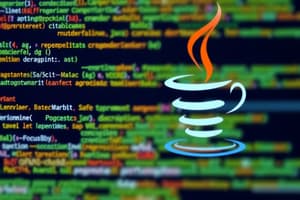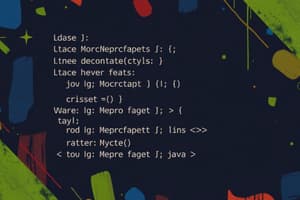Podcast
Questions and Answers
What is one characteristic that sets Java apart from C++?
What is one characteristic that sets Java apart from C++?
- Java is simpler and has fewer negative aspects. (correct)
- Java is a low-level programming language.
- Java supports multiple inheritances.
- Java uses procedural programming exclusively.
Which of the following aspects does Object-Oriented Programming (OOP) in Java emphasize?
Which of the following aspects does Object-Oriented Programming (OOP) in Java emphasize?
- Sequential code execution.
- Strict type checking.
- Global variable usage.
- Encapsulation, inheritance, and polymorphism. (correct)
Why is Java considered a general-purpose programming language?
Why is Java considered a general-purpose programming language?
- It can be used to develop applications across various domains. (correct)
- It is designed only for enterprise-level software.
- It is effective only for Android app development.
- It is solely used for web applications.
Which statement about Java's future significance is accurate?
Which statement about Java's future significance is accurate?
Which of the following is NOT a type of application typically developed using Java?
Which of the following is NOT a type of application typically developed using Java?
What character is used to mark the end of a statement in Java?
What character is used to mark the end of a statement in Java?
Which statement about reserved words in Java is true?
Which statement about reserved words in Java is true?
What do braces {} signify in a Java program?
What do braces {} signify in a Java program?
When is it appropriate to use semicolons in Java?
When is it appropriate to use semicolons in Java?
What symbol precedes a comment line in Java?
What symbol precedes a comment line in Java?
Which of the following is NOT a special symbol used in Java?
Which of the following is NOT a special symbol used in Java?
What should be included at the beginning of a Java program to ensure proper documentation?
What should be included at the beginning of a Java program to ensure proper documentation?
What purpose do parentheses () serve in Java?
What purpose do parentheses () serve in Java?
What will the output of the operation 'int result = 10 / 4;' be, considering the variables used?
What will the output of the operation 'int result = 10 / 4;' be, considering the variables used?
Which of the following statements about Boolean variables is true?
Which of the following statements about Boolean variables is true?
If you declare variables 'int a = 5, b = 3;' and then perform 'int sum = a + b - 2;', what will be the value of 'sum'?
If you declare variables 'int a = 5, b = 3;' and then perform 'int sum = a + b - 2;', what will be the value of 'sum'?
What does the % operator return when applied in a division operation?
What does the % operator return when applied in a division operation?
Which of the following variables is correct for storing a character value?
Which of the following variables is correct for storing a character value?
What is the purpose of the Java compiler in relation to error detection?
What is the purpose of the Java compiler in relation to error detection?
What does Java use to provide security mechanisms?
What does Java use to provide security mechanisms?
Which statement is true about Java's portability?
Which statement is true about Java's portability?
In Java, what is the role of the main method?
In Java, what is the role of the main method?
Which of the following is a required component of every Java program?
Which of the following is a required component of every Java program?
What is the correct statement terminator in Java?
What is the correct statement terminator in Java?
Which of the following correctly describes the structure of a simple Java program?
Which of the following correctly describes the structure of a simple Java program?
What is the output of the following Java code? System.out.println("Welcome to Java!");
What is the output of the following Java code? System.out.println("Welcome to Java!");
What is the primary purpose of comments in Java code?
What is the primary purpose of comments in Java code?
Which symbol denotes the start of a single-line comment in Java?
Which symbol denotes the start of a single-line comment in Java?
What should be done when naming classes in Java according to naming conventions?
What should be done when naming classes in Java according to naming conventions?
What type of error is identified only after the program has started running?
What type of error is identified only after the program has started running?
In Java, how should braces be styled according to block styles?
In Java, how should braces be styled according to block styles?
What does a logic error produce in a Java program?
What does a logic error produce in a Java program?
What is the recommended indentation style when writing Java code?
What is the recommended indentation style when writing Java code?
What actions can you perform with a variable in Java?
What actions can you perform with a variable in Java?
Flashcards
Java's purpose
Java's purpose
Java is a general-purpose programming language, widely used for developing applications for the internet and various devices, including Android.
Object-Oriented Programming (OOP)
Object-Oriented Programming (OOP)
A popular programming approach in software development that promotes code reusability, modularity, and clarity. It focuses on objects, which encapsulate data and methods.
Java's simplicity
Java's simplicity
Java is designed to be easier to use than similar languages like C++, retaining much of its function and capabilities.
Java's object-oriented nature
Java's object-oriented nature
Signup and view all the flashcards
Java's applications
Java's applications
Signup and view all the flashcards
Java's Robustness
Java's Robustness
Signup and view all the flashcards
Java's Security
Java's Security
Signup and view all the flashcards
Java's Portability
Java's Portability
Signup and view all the flashcards
Java Bytecode
Java Bytecode
Signup and view all the flashcards
Java Class
Java Class
Signup and view all the flashcards
Java main Method
Java main Method
Signup and view all the flashcards
Java Statement
Java Statement
Signup and view all the flashcards
Java Class Naming
Java Class Naming
Signup and view all the flashcards
Statement Terminator
Statement Terminator
Signup and view all the flashcards
Reserved Words
Reserved Words
Signup and view all the flashcards
What do curly braces ({}) represent?
What do curly braces ({}) represent?
Signup and view all the flashcards
What are special symbols used for?
What are special symbols used for?
Signup and view all the flashcards
Programming Style
Programming Style
Signup and view all the flashcards
Comments in Java
Comments in Java
Signup and view all the flashcards
Why are comments important?
Why are comments important?
Signup and view all the flashcards
What are naming conventions?
What are naming conventions?
Signup and view all the flashcards
Single-Line Comment
Single-Line Comment
Signup and view all the flashcards
Multi-Line Comment
Multi-Line Comment
Signup and view all the flashcards
Naming Convention (Class)
Naming Convention (Class)
Signup and view all the flashcards
Indentation
Indentation
Signup and view all the flashcards
Spacing
Spacing
Signup and view all the flashcards
Block Styles (End-of-Line)
Block Styles (End-of-Line)
Signup and view all the flashcards
Syntax Error
Syntax Error
Signup and view all the flashcards
Runtime Error
Runtime Error
Signup and view all the flashcards
What are Variables?
What are Variables?
Signup and view all the flashcards
What are Data Types?
What are Data Types?
Signup and view all the flashcards
Boolean Type
Boolean Type
Signup and view all the flashcards
Declare Multiple Variables
Declare Multiple Variables
Signup and view all the flashcards
What are Operators?
What are Operators?
Signup and view all the flashcards
Study Notes
Programming Lecture 2: Introduction to Java
- The lecture was given by Dr. Ikram Ur Rehman at the School of Computing and Engineering, University of West London.
- The lecture covered an introduction to Java programming, including its overview, characteristics, popular IDEs (Integrated Development Environments), compiling Java source code, the first Java program, the anatomy of a Java program, programming style and documentation, programming errors, variables, and arithmetic operators.
Overview
- Java Characteristics
- Anatomy of a Java Program
- Programming Styling and Documentation
- Types of Errors
- Variables and Data Types
- Arithmetic Operators
Why Java?
- Java is a general-purpose programming language.
- Java is the Internet programming language.
- More than 3 billion devices run Java.
- Java is used to develop apps for various platforms like Google's Android OS, desktop applications (e.g., media players, antivirus), web applications, and enterprise applications (e.g., banking).
- The future of computing is influenced by the Internet, and Java plays a significant role.
Characteristics of Java
- Simple: Java is based on C++, but it's simpler and improved.
- Object-Oriented: Java is designed from the start to be object-oriented (OOP). OOP is replacing traditional procedural programming. Key OOP advantages include code reusability, flexibility, modularity, and clarity via encapsulation, inheritance, and polymorphism.
- Robust: Java compilers detect problems during compilation rather than runtime, unlike other languages.
- Secure: Java has security mechanisms to protect against harmful code.
- Portable: Java programs run on any platform with a Java Virtual Machine (JVM).
Popular Java IDEs
- NetBeans (the one used in this lecture)
- Eclipse
Compiling Java Source Code
- Java source code is compiled into bytecode.
- Bytecode runs on a Java Virtual Machine (JVM), which is on any computer.
Your First Java Program
- Every line of code that runs in Java must be inside a class.
- Each Java application has an entry point, which is the
mainmethod.
Anatomy of a Java Program
- Class name: Every Java program needs at least one class, and each class has a name (e.g., Welcome). By convention, class names start with an uppercase letter.
- Main method: The
mainmethod is the starting point of execution in a Java program. - Statements: represent actions in the code.
- Statement terminator: Semicolons (;) mark the end of each statement.
- Reserved words: Words with special meaning for the compiler (e.g.,
class,public,static,void). - Comments: explanatory notes within the code (
//for single line,/* */for multiple lines). They are ignored during compilation. - Blocks: code sections enclosed in braces (
{}).
Programming Style and Documentation
- Appropriate comments: Include summaries and explanations in the program. Include your name, class details, instructor, date, and brief description.
- Naming conventions: Choose descriptive names for classes (capitalize first letter of each word).
- Proper indentation and spacing lines: Use consistent indentation and space for code readability.
- Block styles: Use end-of-line (or next line) styles for braces.
Programming Errors
- Syntax errors: Detected by the compiler.
- Runtime errors: Causes the program to abort when running.
- Logic errors: Produces incorrect results.
Variables
- Variables store data.
- Variables have names (identifiers).
- Variables have types (e.g.,
String,Integer,Double,Char). - Variables are associated with their type. You can only assign values of that specific type.
Arithmetic Operators
- Java supports a wide array of operators (e.g.,
+,-,*,/,%). - Operands are the values used with operators.
Addition and Subtraction
- The
+,-operators work with constants, variables, and combinations of both.
Multiplication and Division
- The
*operator multiplies two operands. - The
/operator divides.
Modulo
- The
%operator (modulo) returns the remainder of a division.
Studying That Suits You
Use AI to generate personalized quizzes and flashcards to suit your learning preferences.
Related Documents
Description
This quiz covers the key concepts from the second lecture on Java programming by Dr. Ikram Ur Rehman. It includes topics such as Java's characteristics, the structure of Java programs, and essential programming principles like variables and arithmetic operators. Test your knowledge on the fundamentals of Java and its applications.




